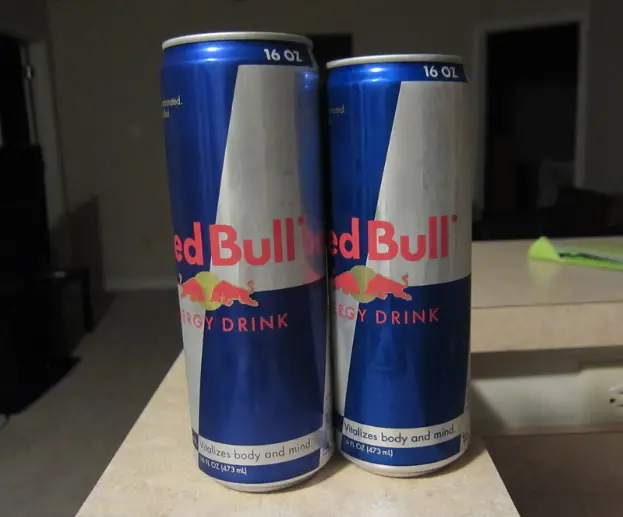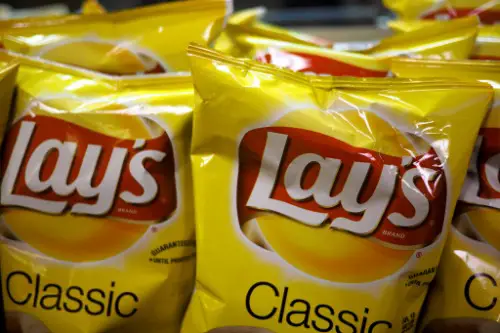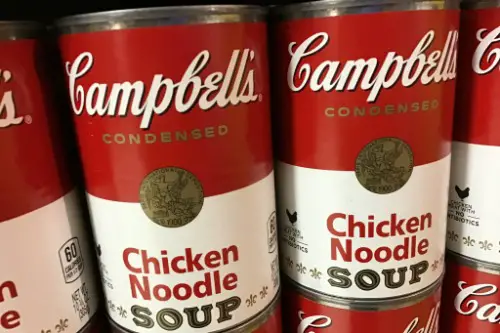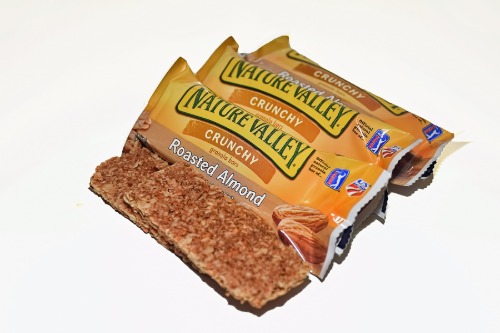1. Energy Drinks

Energy drinks are often marketed as a quick way to boost energy levels, but they come with significant health risks, according to nutritionist Kerry Torrens from Good Food. Packed with sugar, caffeine, and other stimulants, these drinks can spike your blood sugar and raise your heart rate, leading to anxiety, jitters, and even heart palpitations. Consuming them regularly can cause long-term issues like dehydration and increased stress on your heart, particularly for those with pre-existing heart conditions. Some energy drinks also contain high doses of caffeine, which can interfere with your sleep cycle and increase your risk of insomnia.
Beyond the immediate effects, energy drinks can contribute to a cycle of dependence, where you feel like you need more caffeine to feel alert. Over time, this can disrupt your body’s natural energy regulation and increase your reliance on stimulants. Instead of reaching for an energy drink, try drinking water or tea for a natural energy boost. If you need more energy, focus on getting enough sleep and maintaining a balanced diet.
2. Processed Meats (Bacon, Sausages, Hot Dogs)

Processed meats are a go-to for many Americans, whether it’s a crispy strip of bacon or a grilled hot dog at a summer barbecue. But the health risks associated with these foods are pretty serious, according to Dr. Atli Arnarson from Healthline. Processed meats are packed with preservatives, including nitrates and nitrites, which are linked to an increased risk of cancer, particularly colorectal cancer. Regular consumption can also lead to heart disease due to the high levels of sodium and saturated fat they contain.
While bacon and sausages might taste great in a breakfast sandwich, eating them too frequently can put a strain on your cardiovascular system. Processed meats are also high in cholesterol, which can raise your risk of developing high blood pressure and cholesterol problems. To keep things in check, try enjoying them as an occasional treat rather than a daily staple. There are also healthier alternatives, like turkey bacon or plant-based sausages, which offer a similar taste without the harmful effects.
3. Sugary Soft Drinks

Soda has been a long-time favorite for Americans of all ages, but it comes with some serious health risks, according to nutritionist Kerry Torrens from Good Food. Sugary soft drinks are packed with empty calories and high levels of sugar, contributing to weight gain, type 2 diabetes, and even heart disease. A single can of soda can contain as much as 40 grams of sugar, far exceeding the recommended daily intake. Over time, consuming sugary drinks can increase the risk of insulin resistance and promote chronic inflammation in the body.
Beyond the sugar, many sodas also contain artificial sweeteners or flavorings, which might have other hidden health implications. The excessive sugar intake can lead to a surge in blood sugar, followed by a crash that leaves you feeling sluggish. If you’re craving something sweet, try sparkling water or homemade fruit-infused drinks as a healthier alternative. Cutting back on soda doesn’t just help your waistline, it also supports your long-term well-being.
4. Fast Food Burgers

Fast food burgers are a quick and easy meal, but they often come with a side of health problems, according to Stacey Leasca from Food & Wine. Many fast food joints use low-quality meat that’s high in unhealthy fats, calories, and sodium. The burgers themselves are loaded with processed ingredients, like refined buns and cheese that contain unhealthy trans fats. The combination of saturated fats and high sodium content can lead to heart disease, high cholesterol, and high blood pressure when consumed regularly.
While it’s tempting to grab a burger on the go, making fast food a habit can severely impact your health over time. The calorie count is often higher than expected, and those extra calories are usually from unhealthy sources. If you find yourself craving a burger, try making one at home with lean meats or plant-based options. It’s a simple way to keep your burger indulgence on the healthier side.
5. Microwave Popcorn

Microwave popcorn is a convenient snack for movie nights, but it’s often loaded with unhealthy ingredients, according to Taylor Ann Spencer from Delish. Some brands contain artificial flavorings like diacetyl, which has been linked to lung disease when inhaled in large amounts. Even though you’re not inhaling it, these chemicals can still be absorbed into your body through digestion. The bags themselves often contain perfluorooctanoic acid (PFOA), a chemical that’s been associated with cancer.
Besides the chemicals, many microwave popcorn varieties are packed with unhealthy fats and salt. Eating this snack frequently can contribute to weight gain, as well as higher cholesterol and blood pressure. If you want a healthier popcorn option, try making it on the stovetop with a small amount of olive oil or in an air popper. This way, you control the ingredients and avoid the hidden dangers in pre-packaged versions.
6. Artificial Sweeteners (Diet Soda, Sugar-Free Snacks)

Artificial sweeteners are often seen as a healthier alternative to sugar, but they come with their own set of health risks. Aspartame, sucralose, and other sweeteners found in diet sodas and sugar-free snacks have been linked to an increased risk of metabolic disorders, including obesity and type 2 diabetes. They trick the brain into thinking it’s consuming sugar, but without the calories, leading to cravings for more sugar and unhealthy food choices. Over time, this can disrupt your metabolism and lead to an unhealthy cycle of overeating.
There’s also some evidence suggesting that artificial sweeteners may negatively impact gut health by disrupting the balance of healthy bacteria in the digestive system. While they don’t directly contribute to weight gain, they can make it harder for your body to regulate appetite. If you’re trying to cut down on sugar, the best approach is to limit both sugary foods and artificial sweeteners. Opt for natural sweeteners like stevia or honey, which may be healthier alternatives.
7. Frozen Dinners

Frozen dinners are marketed as a quick and easy meal solution, but they can be loaded with sodium, preservatives, and unhealthy fats. Many frozen meals contain high levels of sodium to help preserve the food and enhance flavor, which can lead to high blood pressure and an increased risk of stroke. The fats used in these meals, often hydrogenated oils, are typically trans fats, which are harmful to heart health. Even if the meal looks like a “balanced” option, it’s often lacking in fresh ingredients and healthy nutrients.
Eating frozen dinners regularly can also contribute to weight gain, as they tend to be high in calories but low in nutritional value. While they may be convenient, they often don’t provide the vitamins and minerals your body needs to stay healthy. Instead of relying on frozen meals, consider meal prepping with fresh ingredients that you can freeze yourself, ensuring that your meals are both nutritious and convenient.
8. Potato Chips

Who doesn’t love to snack on a bag of crispy potato chips while binge-watching TV? However, these salty treats come with some serious risks. Potato chips are packed with unhealthy fats, especially trans fats, which are known to increase your risk of heart disease. Not only do they raise your cholesterol levels, but the high sodium content can also lead to high blood pressure and dehydration.
On top of the unhealthy fats and sodium, potato chips are often fried in oils that are high in omega-6 fatty acids, which can cause inflammation in the body. Regularly indulging in chips can also contribute to weight gain due to their high calorie density. While they’re tasty, it’s a good idea to save them for an occasional snack and opt for healthier alternatives, like air-popped popcorn or baked veggie chips.
9. Ice Cream

While ice cream is a favorite dessert for many, it’s not doing your health any favors. It’s often packed with sugar, unhealthy fats, and artificial ingredients that contribute to weight gain and an increased risk of chronic conditions like diabetes and heart disease. A single serving of regular ice cream can have over 20 grams of sugar, and when eaten in excess, these sugar spikes can lead to insulin resistance. Plus, the high-fat content can raise your cholesterol levels, putting strain on your heart.
On top of the sugar and fat, many ice creams contain stabilizers and artificial flavorings, which offer little nutritional value. If you have lactose intolerance or a sensitivity to dairy, these ingredients could also cause digestive discomfort. While an occasional scoop won’t hurt, it’s best to limit your intake of ice cream and look for healthier alternatives like frozen yogurt or sorbet. These alternatives are often lower in sugar and fat while still satisfying your sweet tooth.
10. Canned Soup

Canned soup is another food that seems convenient but can pack a punch in terms of health risks. Many canned soups are loaded with sodium, which is used as a preservative and flavor enhancer. A single can can contain over half of your recommended daily sodium intake, which can contribute to high blood pressure and increase your risk of heart disease. Furthermore, many brands add artificial flavorings, preservatives, and unhealthy fats, turning a seemingly healthy meal into a calorie-laden, nutrient-poor choice.
While canned soups are convenient, they don’t offer much in terms of fresh ingredients or nutritional value. The high sodium content also means you’re more likely to feel thirsty and bloated after eating them. If you’re craving soup, it’s better to make your own at home using fresh, whole ingredients. This way, you can control the salt and ensure that your meal is both tasty and nutritious.
11. Granola Bars

Granola bars are marketed as a healthy snack, but many of them are surprisingly packed with sugar and unhealthy fats. While they may seem like a nutritious option because they’re made with oats, dried fruit, or nuts, the added sugars and oils can quickly turn them into a calorie-dense, nutrient-poor food. Some bars contain as much sugar as a candy bar, and many are made with processed ingredients that offer little nutritional benefit. If you’re grabbing a granola bar for a quick snack, you could be consuming more sugar and fat than you realize.
Even the “low-fat” or “protein” versions can be misleading, as they often replace fat with excess sugar or artificial sweeteners. Eating granola bars regularly can contribute to weight gain, especially if you don’t keep an eye on the portion size. To make a healthier choice, consider making your own granola bars at home using whole ingredients like oats, nuts, and natural sweeteners. This way, you get all the benefits without the unnecessary additives.
12. Frozen Pizza

Frozen pizza might be a quick and easy dinner option, but it’s not exactly a health food. Many frozen pizzas are made with refined white flour crusts and processed meats like pepperoni, which are high in saturated fats, sodium, and preservatives. A single slice can pack up to 500 calories, with most of those calories coming from unhealthy fats and refined carbs. Over time, consuming frozen pizza regularly can lead to weight gain, high cholesterol, and an increased risk of heart disease.
The cheese used in frozen pizzas is often highly processed, contributing to even more saturated fats. And while it may seem like a convenient option, most frozen pizzas lack the fresh vegetables and whole grains your body needs for balanced nutrition. Making pizza at home with whole ingredients, like whole wheat crust and fresh veggies, is a much healthier choice. You’ll enjoy the same flavors without the added health risks.
13. Fruit Juice

Fruit juice may seem like a healthy drink option, but it’s often packed with sugar and lacks the fiber of whole fruit. Even though juice contains vitamins like vitamin C, the high sugar content can spike your blood sugar levels, contributing to weight gain and increasing the risk of type 2 diabetes. Many store-bought juices are made from concentrate and have added sugars, making them far less nutritious than fresh fruit. Drinking large amounts of juice can also lead to dental problems due to its high acidity.
While fruit juice is refreshing, it doesn’t provide the same nutritional benefits as eating whole fruit, which contains fiber that slows the absorption of sugar. If you’re craving a fruity drink, it’s better to blend whole fruit into a smoothie to preserve the fiber. This way, you’ll get the vitamins and antioxidants without the sugar crash. Moderation is key—if you love juice, just be mindful of portion sizes and opt for 100% fruit juice with no added sugar.


